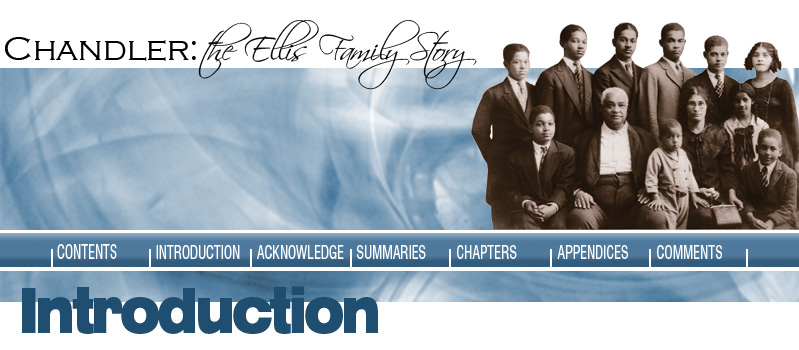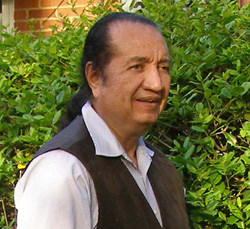
|
There are long lists of families who made notable contributions to Oklahoma's settlement and development. Ellis, the name of a black family from Chandler, will always be among those at the top of these lists. The family of Whit and Maggie Ellis made many extraordinary accomplishments, especially in the field of education. Their achievements were realized at a time when being black was not only a major barrier to obtaining an education, but for doing everything else as well. The U. S. Department of Education’s 2005 Digest of Education Statistics' tables and figures report (Table 8), clearly illustrates the significance of the Ellis family accomplishments. In 1950, for the U.S. population as a whole, about 34 percent of those over 25 years of age attained a high school diploma or higher, and more than six percent finished college. African Americans achieved significantly less. Only about 14 percent of blacks in this group earned a high school diploma or higher, and less than three percent graduated from college. The Ellises achieved 100 percent in both categories. In addition, eight Ellises received master’s degrees, and two went on to earn doctoral degrees. Most of the degrees were from the prestigious University of Michigan in Ann Arbor, Michigan. Equally important to their academic achievements, each Ellis child became a leader and role model for their children, relatives, and others fortunate enough to cross their paths. A list of major Ellis family accomplishments can be found in Appendix D. An astonishing number of times an Ellis family member was the first black person to achieve a milestone. The obvious question arises: Why was the Ellis family able to accomplish so much under such challenging circumstances? Finding an answer is the goal of this document. What follows are details which may be useful in answering the Ellis family question. For those with a similar family history, we hope Chandler: The Ellis Family Story will provide a better understanding and deeper appreciation of the sacrifices made by their ancestors. These sacrifices now allow them to enjoy a life of unlimited potential. For those who come from a different background, we hope for better appreciation of the tremendous additional level of effort required by African Americans to enjoy the privileges many now take for granted. The information for answering the Ellis family question comes from two separate but related research efforts. The first was undertaken between 1995 and 2000, to write a history of the family of Maggie and Whit Ellis, covering the period 1899-1954. In 2001, the results of this research, Chandler: The Ellis Family Story, were placed on the family website you're now browsing. They pointed out one important point: the Ellis family was only one of many families that made noteworthy contributions to the settlement and development of Lincoln County, Oklahoma. The fact that little has been written about these other families, was motivation for a follow-up, expanded research effort. The second research effort took place between 2002-05 and focused on discussing the backgrounds of other Lincoln County black families. The results of this follow-up research project, The Negro Problem in Lincoln County, Oklahoma (1899-1954), were presented on March 5, 2005 at the Lincoln County Historical Society Museum. They expanded the understanding and significance of all aspects of The Ellis Family Story. For the benefit of history buffs, let’s spend a few moments on this interesting follow-up project. The Negro Problem In Lincoln County, Oklahoma (1889-1954) is a brief history of the black pioneers who first settled in Lincoln County, Oklahoma. In the late 1880s, thousands of Americans began migrating to the undeveloped frontiers of the Oklahoma Indian Territory. The pioneers came from all parts of the United States. Their goal was to start a new life in an area that would become Oklahoma, the forty-sixth state of the United States. In Lincoln County, Oklahoma, an estimated ten percent of the pioneers were of African decent. Determining a role for them in the new homeland created a major issue often referred to as “The Negro problem.” Our story is about the special group of black pioneers who voluntarily settled in one of Oklahoma’s 77 subdivisions, Lincoln County. Not included in this group are the black Americans connected to the Indian tribes forced to migrate to the Oklahoma Indian Territory. The Negro Problem in Lincoln County, Oklahoma covers the period from the beginning of large-scale Lincoln County resettlement (1889), until the 1954 Brown vs. the Board of Education Supreme Court decision. That decision completely restructured the Negro Problem playing field. The Negro Problem raised many questions; the most important are related to four fundamental issues:
Each black community developed its own unique style for responding to the Negro Problem questions. Some responses were loud and clear; others were only a faint whisper. The Negro Problem focuses on discussing “black communities” and should not be confused with comments on “black settlements.” The two are defined quite differently. Black community characteristics include smaller and less official groups of black residents:
The findings of The Negro Problem project provided several things. First, the results made available additional details about life in all parts of Lincoln County and a greater understanding of the challenges faced by the Ellis family. The results also provided a much larger base for understanding the uniqueness of the Ellis family’s experiences. The new information made it clear that the original Ellis family story draft required updating and that Oklahoma history related to Lincoln County was incorrect in one respect. The results of The Negro Problem research corrected a false statement found in many historical discussions of Oklahoma's black settlements. A black settlement called "Wellston Colony" is listed as located in Lincoln County. During the six years of travel and research in all parts of Lincoln County, a person having any knowledge of this colony in Lincoln County was never encountered. Furthermore, there is no mention of the black settlement in any locally written history books. The bottom line is the "Wellston Colony" never existed in Lincoln County, Oklahoma. The information gathering methodology for both projects is identical. The primary source is personal interviews with first- and second-hand observers. Almost all interviews were recorded; none have been transcribed. Over one hundred audio tapes recording the comments of more than one-hundred and thirty contributors were made. Almost all interviews took 30-90 minutes and were conducted in private homes. The majority of the interviewees had passed their 70th birthday. A significant number were 80 years and older. Newspaper articles, historical documents, and photos supplement the recorded interviews. As you will observe, The Ellis Family Story is an oral history. Only a small amount of attention is given to genealogy. This was intentional. Family genealogy is recorded in various documents and permanently available. Unfortunately, the interesting historical details of how the Ellis family world differs from that of other families rests solely in the memories of a few very senior individuals. I have accepted the mission of recording their knowledge before it is no longer available. As you can expect, time is my greatest adversary. One of my earliest childhood memories is listening to stories of my mother’s family. The tales humorously describe the family of Maggie and Whit Ellis as they lived in a small, central Oklahoma town during the first half of the 1900s. They cover almost every imaginable aspect of life. After many years of hearing those adventures retold at every family gathering, it is obvious that we still struggle with many of the same problems my mother’s family faced some 100 years ago. Surely, history repeats itself. I am Mel Chatman, the son of Margrett Ann Ellis Chatman (Ann). Ann was Maggie and Whit’s youngest daughter and tenth child. I’ll be your host, retelling family stories as shared with me by four of my uncles, other relatives, and friends of the family. My approach for presenting Chandler: The Ellis Family Story is heavily influenced by personal experiences. I served thirty years as a Foreign Service officer with the Federal government and six years in the U.S. Army. Thirty years of my career were spent overseas, living in eight different countries. These experiences were very useful in understanding the universal aspects of the challenges faced by the Ellis family. The challenges they faced, in some form or fashion, are found in all parts of the world. They are not unique to America. For example, many of the immigrants arriving in America today have similar problems. The lessons learned from the Ellis family experiences will certainly be useful to them. The details are presented as they exist in our family’s oral history. Their accuracy, to the extent possible, was verified by comparing the reports of different individuals on the same event. Your suggestions on how to improve our story would be greatly appreciated. Please send comments to me at [email protected]. My final comment is a request. I hope The Ellis Family Story will not be labeled solely as black history. While it is an historical account of a black family, more importantly, it must also be considered as one of many details still missing from a complete and truthful history of the United States. To only classify our story as black history would suggest a limited audience focus. We believe the lessons learned have value to everyone and not just to those with appearances similar to the Ellis family. Recording our family history is one small way of thanking my wonderful uncles for being such beautiful human beings. Each one has been a role model for my brother and me. Their years of devotion and kindness can never be fully repaid. It can only be noted. I hope they enjoy their story!
|
||
